Priyanka Nair (Joshi)'s Blog, page 17
August 7, 2021
6 Ways to Love Yourself: Because Self-Love is Self-Preserving
Society often emphasizes the need to care for others. Although you need to look after your loved ones, don’t prioritize their needs forgetting your own. But what is learning to love yourself? Contrary to popular belief, loving yourself isn’t about selfishness. Instead, loving yourself involves attending to your wants, so you have enough love to share with others.
Moreover, to love yourself goes beyond words; you need to align your actions with your intuition. Whether you’re single or dating someone from the best dating sites, here are a few ways to love yourself when you don’t know how.
6 Ways to Love YourselfHow to love yourself, how to put yourself first? Is it selfish to do so or is it just the right thing to do?
1. Forgive Yourself
Your inability to love yourself may arise from grudges you hold against yourself. Whether you mistreated an ex or missed a career opportunity, bitterness steals your joy and prevents you from forging meaningful relationships. There are several ways to love yourself through self-forgiveness. Start by being honest with yourself. You can only love yourself once you know the source of your guilt.
What’s more, acknowledge your errors aloud. By voicing your thoughts and emotions, you take full accountability and release your burdens. You could also learn how to love yourself again by pausing negative thoughts.
You cannot change the past by remembering traumatic events. Instead, picture yourself putting your pain in a jar and leaving it there until you’re ready to deal with it. Another way to love yourself is through apologies. Like apologies to other people, self-forgiveness requires honesty. Feel free to send yourself a letter and refer to it whenever you’re unable to love yourself.
2. Work Out
The exercise shows you how to love yourself when you don’t know how. First off, physical activity benefits your mental health. By stimulating endorphins, exercise soothes your muscles for tension release. Moreover, physical activity increases your brain’s responsiveness to norepinephrine and serotonin, hormones that relieve depression.
Exercise also fights loneliness. You meet new people when you go to the gym or play team sports like basketball. Don’t forget the weight loss benefits! Cardiovascular workouts such as swimming and running lower your appetite and increase metabolism to hasten calorie burning. Likewise, workouts help you love yourself by toning your muscles and giving you the body you’ve always wanted.
Another reason to get active is to keep hypertension, cancer, and diabetes at bay. Past studies name lack of exercise as a major chronic illness cause. Exercise doesn’t necessarily mean hitting the gym. Morning jogs, dance parties, even house chores like babysitting and cleaning keep you active.

3. Healthy Eating
Binging, consuming large portions, or eating junk food is no way to love yourself. Besides inviting obesity, poor nutrition exposes you to diabetes, hypertension, and heart problems. Healthy food choices take different forms. For starters, replace processed foods with whole alternatives. Because they digest quickly, the body burns less energy trying to break down processed foods, hampering weight loss. Apart from packing more calories, processed foods activate the dopamine centre to increase food cravings.
Additionally, increase your food and veggie consumption. Phosphorus, magnesium, zinc; you name it, fruits and vegetables supply essential minerals and vitamins. This is in addition to their high fibre content that improves gut health. Some fibre sources include apples, green peas, cauliflower, pumpkin, and raspberries. Since they contain fewer calories, you can indulge in fruits and vegetables while watching your weight.
Remember, healthy eating isn’t just about what you eat but how you eat. For example, eating slowly lets you know when you’re full. Another way to love yourself is by limiting distractions during mealtime to enjoy your food.
4. Get Enough Sleep
Sleep features prominently in the list of what ways to love yourself are. For starters, sleep boosts concentration and cognition for more productivity. Similarly, rest improves athletic performance by facilitating muscle repair and increasing coordination and energy levels.
Sleep also aids weight control. Sleep deprivation increases the hormone ghrelin that boosts appetite and reduces leptin that signals satiation. Again, staying awake disrupts circadian patterns and presents more opportunities to eat. You may want to love yourself more, but sleep doesn’t always come easy.
You can fight insomnia by avoiding caffeine before bedtime. By stimulating the nervous system, caffeine keeps you alert when you’re supposed to be sleeping. If you cannot do without coffee, stick to decaffeinated alternatives. You can also adopt relaxation activities before bedtime. Biofeedback techniques, autogenic training, and breathing exercises come in handy to lower blood pressure and heart rate for an overall sense of wellbeing.

5. Invest in Quality Relationships
Although you have to love yourself first, you also need love from other people. For starters, healthy relationships allow you to love yourself by promoting personal growth. You’re more likely to chase your dreams when you have someone cheering you on.
Social connections also help you to love yourself by reducing stress. Friends provide emotional support during traumatic events such as illnesses or a loved one’s death. The first step of building healthy relationships is communication. Apart from effective listening, communicate your needs to avoid misunderstandings.
What’s more, spend quality time with your friends, family, or romantic partner. Even if you’re busy, take time off your schedule to connect with the people you value. You can find shared interests like dancing and cooking, or try new things together, for instance, eating at a new restaurant.
6. Follow Your Passion
Financial constraints, uncertainty, and unsupportive friends make it hard to love yourself and follow your passion. However, chasing your dreams is rewarding. First off, pursuing your passion is fulfilling. Provided you don’t have malicious intentions, working towards something greater than yourself adds meaning to your life.
When you love yourself too much and follow your passion, you become happier since your pursuits no longer feel like work. You also become more persistent. You’re less likely to give up or worry about naysayers when doing what you love.
Working on your passion is surely a way to love yourself. You can identify your passion by looking at the things you already enjoy doing. Whether it’s writing stories or playing music, find a way to make money from your hobbies. You can also seek insight from your friends and relatives. Your inner circle might identify abilities in you that you never knew existed.
Conclusion: Can You Learn to Love Yourself in a Relationship?
You can still learn how to love yourself when in a relationship with these workable ways to love yourself. In addition to increasing empathy, self-love reveals your self-worth to prevent other people from taking advantage of you. This is possible by establishing boundaries with your lover, spending time alone, and making new friends. Is it true that you have to love yourself first to spread love to other people? Tell us why it’s important to love yourself in the comments.
Davis is a marriage and family therapist. She has worked in a variety of therapeutic settings over the past 7 years providing services to children, adults, families, and couples. She is currently doing specific research on the topic. Miranda loves travelling and hiking.
August 5, 2021
Mental Health Literacy in India
It is a worldwide clamour as we lack mental health awareness, we lack mental health literacy. First, people don’t believe that something like mental illness exists, even if they do, they find it a shameful thing to even talk about.
Mental health literacy in India has a long way to go before we sensitize our society in learning the right language about mental health. The knowledge and awareness about mental disorders have been neglected as compared to physical illness.
Research says, “If the public’s mental health literacy is not improved, this may hinder public acceptance of evidence-based mental health care. Also, many people with common mental disorders may be denied effective self-help and may not receive appropriate support from others in the community.”
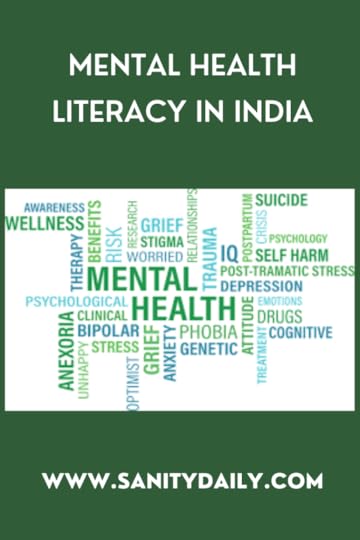 Mental health literacy in India
Mental health literacy in India
Mental health literacy in India is still a vague concept to address, but its basic aim is to conceptualise and make knowledge accessible to whoever wants to promote overall well-being. Since mental health is as important as our physical health, we must understand how prolonged mental distress can hamper our physical health.
Many mental disorders show physical symptoms like concentration issues, extreme fatigue, anger, crying, heart-palpitation, troubled sleep, breathing problems etc.
According to Cambridge University Press, Jorm et al introduced the term ‘mental health literacy’ and have defined it as “ knowledge and beliefs about mental disorders which aid their recognition, management or prevention”. Mental health literacy consists of several components, including:
(a) The ability to recognise specific disorders or different types of psychological distress
(b) Knowledge and beliefs about risk factors and causes
(c) Knowledge and beliefs about self-help interventions
(d) Knowledge and beliefs about professional help available
(e) Attitudes that facilitate recognition and appropriate help-seeking
(f) Knowledge of how to seek mental health information
The shame , the stigma and poor mental health literacy in IndiaWhile there is a lot of stigmas attached to seeking professional help when in distress, it is also important to understand that people lack the overall mental health awareness, hence seeking help seems inappropriate for something they don’t believe in.
For many, talking about mental illness is still uncomfortable and for people like me, it is no less than a challenge to continue spreading the awareness when a majority of the population don’t believe in the cause but see you as a preacher.
Also, there lies a dearth of measures taken to make emotional wellness a priority. A few months back, I had signed up a petition at Change.org appealing that school curriculums must include mental health as a topic of study right from a young age, till date I could not even gather 100 signatures.
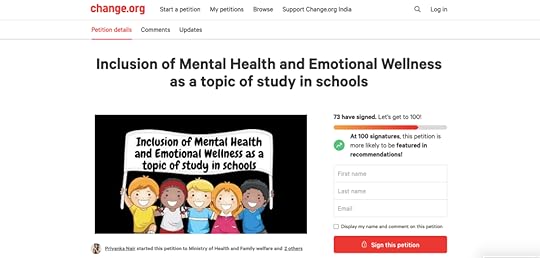
To promote mental health awareness and amplify mental health literacy in India. I took an initiative “Humanity Ki Chain” where I invite experts and guests to share their insights around mental health. This week, I was honoured to host Dr Raghu Raghavan, mental health faculty, in London. He spoke about mental health literacy in India and its need on a deeper level.
He talked about understanding mental health, understanding emotions. How external factors affect our mental health and you might also like to check out his MeHelp India Project where they use theatre to raise mental health awareness. Here is the video you can have a look at:
To conclude, I would say that lack of understanding around mental illness and stigma are an overwhelming barrier in help-seeking behaviour for mental health concerns. If the public’s mental health literacy is not improved, this may hinder public acceptance of evidence-based mental health care as well. Also, many people with common mental disorders may be denied effective self-help and may not receive appropriate support from others in the community.
Love and light
……………………………………………………………………………

Priyanka is a published author of 26 Days 26 Ways for a Happier you, Ardhaviram and Broken & Beautiful. An NLP practitioner and Founder of Sanity Daily, helping you prioritize your mental health. Let’s build a happy community.
August 4, 2021
10 Bizarre Expectations From Indian Daughters in law
Expectations from Indian daughters in law and how it affects them. How expectations create a plethora of distress and unpleasant situations in relationship with in laws.
India is a land of diverse culture, here even if you get married within your own community you will come across different sets of rituals and customs. Forget about the inter-caste and inter-religion marriages, they turn out to be a lifetime challenge for the couples. But no daughter in law could escape from the heavy baggage of expectations by the in laws.
In this blog, let us discuss the types of expectations Indian in laws have with their daughters in law and how it affects the family and relationships.
Expectations from Indian daughters in lawThe picture of daughters-in-law in India is not very pleasant, as they are still burnt alive in the name of dowry and can become a victim of acid-attack to get rid of. This is the reality of any woman struggling in their married life and what is more disheartening you know? The reason behind all this is mostly that other women in the house in the form of a mother in law or sister in law.
Just because of jealousy and insecurity they mistreat her and don’t accept her as their own. The new-age modern and educated daughters-in-law still try to survive this injustice with pride and dignity but what about the ones who don’t even know that there exists a life beyond her husband, in-laws, and her toxic marriage?

Daughters in law are no less than an unpaid caregiver, who was born to cook and serve selflessly to their in-laws and husband. Failing to do so results in domestic violence, arguments, fights, and abuse in the form of physical and emotional abuse.
Women lack support in this even from their parents, in India a daughter is born and her mother starts preparing her for her after-married life. She needs to learn cooking, embroidery, stitching, taking care of elders, being respectful, if a little amount of time and energy were utilized in training boys, in the same way, it would have certainly bought a lot of change in society, but no, the kitchen is women’s area, and they belong there. So you can imagine the level of expectations from Indian daughters in law with the duties they are expected to perform.
I am not a therapist or counselor, I am like many of you and one among you. It breaks my heart when I see how a woman belittles another woman and on the other hand, we are building sisterhood tribes, we talk about women empowerment, and what about the woman you treat disrespectfully in your own house? I am pointing some 10 expectations from Indian daughters in law.
1.) They need to be perfect in everything they do2.) They should obey the elders in the house 3.) They should become selfless 4.) They should strike the perfect balance5.) They should forget their parents6.) They are expected to adjust with a smile 7.) They should support everything8.) They should not opine9.) They should slog and struggle 10.) They should forget that they exist

1.) They need to be perfect in everything they do
Perfection in everything you do and say. No mistakes and no pardon. If you fail then your parents will be blamed for not upbringing you wisely and instilling good skills in you. You are constantly judged and criticized and yet you are expected to one perfect.
2.) They should obey the elders in the house
Obeying elders is a good thing a part of moral ethics and good manners, but can respect be commanded? Your need to earn it through love and care. What is the point of respecting pretentiously and inside cursing that person for ruining that life? Does it even satisfy their small ego?
3.) They should become selfless
Another expectation from Indian daughters in law is you are expected to sacrifice and become selfless, you are expected to sacrifice your beloved dresses, your favorite pieces of stuff, and even your happiness. Family first, as we are taught, and of course we all put our family first but not at the expense of our sanity.
4.) They should strike the perfect balance
Right from managing groceries, bills, finances, even though the husband is the sole source of learning bu the onus of smooth operation of the daily chores in the house lies on the responsible shoulders of the wife. She can fail too, she can be imperfect too, she can also take wrong decisions but she is not expected to do that.
5.) They should forget their parents
Expectations from Indian daughters in law are such that as soon as you get married and enter the in-law house you are expected to treat them as your parent, right from day one you call them mom dad, you search for meanings and try to form relations same as you had in your maternal side, then how can one forget the very basis of their existence? This is not only wrong but unethical.
6.) They are expected to adjust with a smile
Adjust with the societal norms and adjust with each and every member of the family, please them, seek validation from them otherwise how will you become a perfect daughter in laws? How will you win hearts, if ever you could win hearts? I don’t want to sound like a pessimist but I have hardly seen hearts melting. I have never seen a toxic mother in law turn into a loving one.
7.) They should support everything
Expectations from Indian daughters in law are such that they are expected to say yes and do things as per their in-laws direction. When you start using your brain and question or reason, you are not welcomed. You are supposed to support yourself selflessly and your rude mother in law will never appreciate you. You will feel hurt and end up feeling frustrated.
8.) They should not opine
A daughter-in-law cannot opine, she cannot express her views even if she has the best solution to offer. I have seen this many families around me, where I see women saying that we can’t even say a word, let it be. They just see things go haywire in front of them but have to keep mum.
9.) They should slog and struggle
As if it is a part of the legacy system and one of the most bizarre expectations from Indian daughters in law. All the old wives’ tales suggest that women from generations have slogged and struggles a lot to maintain the peace and harmony of their house. So girls should be patient and should tolerate everything their in-laws say. In everything comes abuse, disrespect, ignorance, arrogance, and insult too.
10.) They should forget that they exist
One of the unreasonably worst expectations from Indian daughters in law is to serve selflessly like an unpaid caregiver, who doesn’t even get appreciated for all the efforts she puts to keep everything in order, one must forget that they exist. Only then it is possible to become this mechanical and perform the daily chores as a part of her humdrum life.
To conclude, I would say, we can certainly not control the way our in-laws or others think about us but we should be a little lenient towards our own ourselves. If no one is taking care of you, if no one is understanding you, you need to take charge of your life. Allow yourself to make mistakes, allow yourself to learn from your mistakes, allow yourself to be vulnerable.
Give yourself the space to make mistakes and learn from them, do not fall for the perfectionistm, it is a myth. Every mother does best for her child within her capacity, every daughter in law tries to fit in the new family in the best way possible, remember all the relations are two ways, it doesn’t work if one side has lost track and going in some other direction. So the onus of making everybody happy is not your sole duty but yes maintaining a peaceful environment is, for yourself and for others, so do not get into unnecessary stress, take charge of your mental health and stay sane.
Love and light
……………………………………………………………………………

Priyanka is a published author of 26 Days 26 Ways for a Happier you, Ardhaviram and Broken & Beautiful. An NLP practitioner and Founder of Sanity Daily, helping you prioritize your mental health. Let’s build a happy community.
August 2, 2021
Psychological Effects of Psoriasis in Children | Psoriasis Awareness Month | Sanity Daily
August is the psoriasis awareness month. I have been wanting to share my experience with psoriasis for the past 18 months but the psychological effects of psoriasis are such that I could not just gather the courage to pen down the pain my little girl has been going through all this time.
According to the World Psoriasis Day consortium, 125 million people worldwide—2 to 3 per cent of the total population have psoriasis. Approximately 14.8% to one-third of all psoriasis cases occur by the age of 15. Symptoms often start between ages 15 and 25 but can start at any age. Men, women, and children of all skin colours can get psoriasis.
Psoriasis is a skin condition resulting in skin cells built up, red rashes, dry and itchy patches in any part of the body. In this condition, skin cells generate rapidly and need immediate intervention, no home remedy works here, believe me, I have tried and tested all.
My seven-year-old daughter was diagnosed with Psoriasis amid the complete lockdown in April 2020, when the Novel Corona Virus first wave hit worldwide. We could not take her to the doctor and moreover we could not understand what is happening to her. She had developed red patches in her foot and hands.
Excessive itching and pain all over the affected areas made her way to irritated. We started with home remedies but it hardly helped. I consulted a few doctors online, but they were not seeing any patients until the lockdown is lifted. It was in June 2020, when the unlock began and, I immediately took an appointment and rushed to a skin specialist.
That was the first time, I took her outside since the COVID hit our lives, double masks, gloves, sanitisers made her feel claustrophobic trapped in the situation. She threw up, I had to console her and when we went to the doctor, the diagnosis came as Psoriasis.
Psoriasis is said to be a common skin disease that lasts for years and finding the right doctor and the right cure was the most tedious and nerve-wracking problem as always. Besides, the psychological effects of psoriasis are such that my child began to feel frustrated, and anxious because of it.
 3 Psychological Effects of Psoriasis in Children
3 Psychological Effects of Psoriasis in ChildrenThere were hardly any symptoms, besides sudden itching and skin scaling. The reason is still not clear, as psoriasis is said to be directly linked with your immunity system, or it could be hereditary. But none in our families ever had such skin conditions. I went to at least 4 different doctors and none helped, the fourth one even put her on steroids for a week to control the rapid skin cell generation, she could barely walk as her foot was brutally affected.
I am not sharing the photos purposely, for two reasons, first, it makes me cry and might scare you as well. I finally found a homoeopathic treatment, it has been 6 months now, her condition is stable, although not completely cured, too sensitive, too allergic, we have to take care a lot. But things are in control. Here are 3 major psychological effects of psoriasis, which we personally went through:
1.) Shame and Embarrassment
My daughter began to feel a sense of shame when she was among other people, she would feel what others will feel seeing her hands and foot. She was itchy all the time and had to wash her hands often, which made her agitated.
She felt embarrassed when someone asked her if this is a contagious infection sort of disease, she would come running to me to help her explain what exactly it is.
2.) Helplessness
Since the treatment is a lengthy process, it is way too difficult to keep your child stay hopeful that things will be fine soon. Sometimes, she just bursts out in tears saying, “I cannot bear it anymore, it is too much now”.
3.) The Pain
The pain, itchiness, and discomfort, are taxing. It costs a lot of emotional health deterioration. We, adults, get all frustrated with a single wound, she was dealing with multiple cuts and skin peeling. How would it not affect a child’s mental health?
 Overcoming the psychological effects of psoriasis
Overcoming the psychological effects of psoriasisChildren are not like us, I mean we might end up not moving or being too cautious but she would play, cycle, skate even when her foot cracks would bleed. I had to stop her and this corona anxiety in kids, online schooling, everything started taking a toll over her, she got real irritated and frustrated with her skin condition. She would cry and get angry. I allowed her to.
Honestly, it was not at all easy for me. Rather very tough to see her in constant discomfort. I have bought like end variety of shoes, socks that could make her feel comfortable, tried all the home remedies, tried allopathy, ayurvedic and now homoeopathy.
I would cry while applying the ointment to her foot which was a terrible sight to watch. But we overcame all this together, gradually. I did everything to make her feel comfortable, we would watch Marvel/Harry Potter movies, series so that she can sit in one place. Treatment started showing results and she started playing, dancing but we have to be very cautious as a slight change in weather, cold, dryness again aggravates it.
To conclude, I would admit it is terrible to see your child in pain but sometimes all we can do is allow them to be angry, irritated and frustrated about the situation because everything just kept adding on. This also resulted in a stronger bond between the two of us. She is much better now and since August is the month of psoriasis awareness, I thought of sharing my share of ups and downs, I had with psoriasis to spread the awareness.
Love and light
……………………………………………………………………………

Priyanka Nair is the author of 26 Days 26 Ways for a Happier you and Ardhaviram. An NLP practitioner and Founder of Sanity Daily, helping you prioritize your mental health. Let’s build a happy community.
July 27, 2021
The Importance of Setting Boundaries In the Workplace
Have you ever thought about the importance of setting boundaries in the workplace? If not, please do so and here is why. If you don’t define healthy boundaries at the workplace with your boss, with your colleagues and yourself, chances are, you will soon head towards the very famous “frustration” zone.
In this blog, I am going to share about my first job experience where I sucked at setting boundaries, that eventually harnessed my mental health for the very first time and led me to quit the job.
It was in 2009 after I finished my MBA, I got placed with a well-reputed brand as an assistant manager with a handsome package. I was on top of my world, I moved to Mumbai, stayed alone, managed everything on my own, happily.
I was placed in the headquarters of the organisation and was directly working under the CFO of the company. I use to report to the AGM, and she was one hell of a boss, I came across in my life. She was working there for around 15 years and I joined immediately after my MBA and managed to grab a spot for me, next by her side.
Somehow, she could not take it and from the very first day, she use to criticise me for everything I did. She would throw away my report, simply tear it off and humiliate me in front of others. She would call me to the office on Saturdays and ask me to complete her son’s school projects.
Since I stayed alone, she would never let me leave on time, she would always say no one is waiting for you at home, so what’s the rush. I would reach home by 10 pm, cook, eat and sleep. Then again get up, cook, pack and go to the office. This was my routine for 5 months and it started taking a toll on my physical and mental health.
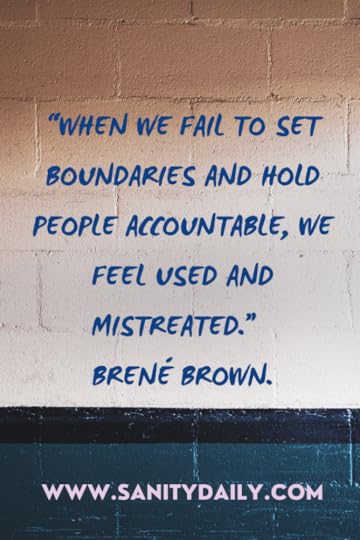
I fell ill, I could not even move, I asked for leave and she thought I am giving an excuse. I could not go to the office for 2-3 days and when I went back, she created a huge scene. That was the time, I decided to quit, I could not take it any more. I called up my dad and told him about everything and he left the decision on me. I quit. I came back and that was when the recession hit the world economy.
I could not find any job for the next few months, but honestly, I was not even ready for it. Because the first experience was so draining and horrifying, for a while I feared getting the same type of boss again and how can I quit every time. All those intrusive thoughts made me so lost.
Later, I found the best job of my life in an MNC in the supply chain division, I worked there for a long time and not to mention, my boss was very strict but he was my mentor too. I have learned many things from him and I still keep in touch with him.
But by this time, I was firm and confident about myself. I was never aware of the concept of boundaries, forget about the importance of setting boundaries in the workplace, so I could not handle it before.
Importance of Setting Boundaries In The WorkplaceI left Mumbai, I left my first job not only because I ended up with the nastiest boss, but I could not draw boundaries in my first job, I could not say NO. I wanted to be available and do everything to please her so that she can stay nice to me. But not everyone wants to get pleased, some want to exploit and that makes a difference between a boss and a leader.
Many of my friends and relatives made a mockery out of my decision of leaving such a high-paying job, some even called me a fool to leave such a job. Even I started doubting myself, but today, I know what I did was right, because I never deserved such kind of treatment just because I earned a position right after my MBA for which she slogged for 15 years.
In my exit interview, I told everything to HR and they even wanted me to come back, but I knew after all this, working with her will only become more challenging. I took my time off and started applying for other jobs.
 5 ways to set better boundaries at work
5 ways to set better boundaries at workI am going to talk about a few ways you can start setting boundaries at work. There are amazing benefits of setting boundaries in the workplace as it improves your work-life balance, your stress level and leads you to a more productive work environment.
The first step is to understand the importance of setting boundaries in the workplace. Why do we need boundaries? Not because we are afraid of hard work, long working hours or criticism, because we must never allow anyone to take away our mental peace and undue advantage.
Knowing your capacity and ability helps you prepare to set the right boundaries from the beginning. So now when you know the importance of setting boundaries in the workplace, here are 5 ways you can set better boundaries in the workplace and save yourself some sanity.
1.) Learn to say NO
Please do it more often. Say no when you are called on weekends, say no when you are asked to stay late without reason, say no when you can’t do a job assigned to you. But say no with grace and be polite in your approach.
2.) Keep your communication channels open
Seek help, talk to your superior when in doubt. I know it doesn’t come easy, especially for men, but if we communicate openly chances are we leave a part of our personality with our superior and even if they disagree, they get a message
3.) Maintain a professional relationship
Thorough professional. No crossing line. Maintain your privacy and respect others privacy at work.
4.) Understanding your own limitations
Understanding your limitations somehow helps to better understand the importance of setting boundaries in the workplace. Knowing how far you can go with a task or commitment, helps you have a realistic approach, also helps to plan and delegate work accordingly.
5.) Be respectful yet assertive
While boundaries sound like being your own boss, but it is still daily practice you have to follow to be productive at work and maintain that work-life balance we all crave for. So even if you have your own disagreements, be respectful and don’t take things personally.
To conclude, I would say people work perfectly and under different circumstances, we all perform differently. This post about the importance of setting boundaries in the workplace is not only for you to stay sane while you earn a living but also help others to not fall into the trap. I hope you will find some value in this post and apply it in your workplace.
Rise up!
Love and light
……………………………………………………………………………

Priyanka Nair is the author of 26 Days 26 Ways for a Happier you and Ardhaviram. An NLP practitioner and Founder of Sanity Daily, helping you prioritize your mental health. Let’s build a happy community.
July 25, 2021
5 Reasons Why A Comeback Is Powerful Than A Setback
Our entire life is defined and shaped by our own thought processes. A process that involves our behaviour and reactions. Do you know when a comeback is powerful than a setback? When you mould your thoughts in a way that prepare you to fight back and take charge of your life.
Fighting back is not easy, especially when you hit the rock bottom when all you see is the darkness around you, but it is also the time for you to prepare yourself to come back and face your fears. Fight all the fears and conquer them, one at a time.
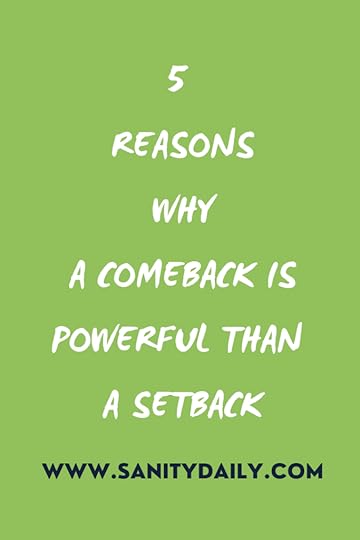
I went through a major setback exactly one year back. My blog Sanity Daily was attacked and targeted by some digital marketer whom I trusted to the core. She did not only left my blog to doom but also made sure I don’t spread the word about her unprofessionalism, so she reached out to our few common contacts and manipulated them.
Being an HSP (Highly sensitive person) it did affect me for a while, she wrote me nasty things, did mean things to me but I never replied to her, I observed everything from a distance, took my time, sat and slept on what happened. Then, I channelised my whole energy into rebuilding myself. I took this as an opportunity to do things in different ways and start fresh. Leaving everything in past.
I found another person to help me fix the blog, learned a few things, worked really hard to bring back the lost position of my blog and, today my blog ranks among the top 25 mental health blogs in India and have made it to many other such listings (organically).
I started earning through my blog by being consistent and writing what my readers wanted to read. Next month, my mental health blog Sanity Daily will be completing its second year in this digital space with more than 2,70,000 page views and readers across 60 countries.
So yes, a comeback is powerful than a setback but we have to work on it, we have to ignore a lot in the process. We have picked up our fights wisely. We have to be very mindful of our choices, if I had put my energy in literally fighting back with her, emailing her, stalking her, trying to understand why she did what she did, maybe I would have lost it altogether. Trust me, she had provoked me a lot.
I worked on my comeback because I did not sign up just to blabber on a digital medium, I have taken up a cause in my hand, people need help, people need listening and sharing, so I kept moving.
Now, with the divorce process happening with me, I am somewhere in between a setback and a comeback, but I see a silver lining, a ray of hope, that although things are tough today it will be better tomorrow. And, I am working on that.
 5 Reasons Why A Comeback Is Powerful Than A Setback
5 Reasons Why A Comeback Is Powerful Than A SetbackA comeback is powerful than a setback because it transforms a lot inside you. It is not always the physical weight we carry makes us feel heavy, it is also the mental baggage, the baggage of past that makes us feel heavier.
We must work on them, we might not get the closer as we desire but we might get some peace for ourselves and prepare for better things ahead. Here are a few reasons that will help you understand why a comeback is powerful than a setback.
1.) It helps you define better boundaries
When you trust people blindly, sometimes they take undue advantage out of it. When you can’t say NO you are taken for granted.
2.) You learn to see through things and people
With each setback you encounter, you develop new optics, to see the world around you, to see the people around you.
3.) You take calculative risks
Perhaps, by now you know what your choices will lead you to. You analyse, calculate and then move ahead with your personal and professional choices.
4.) You become familiar with the pain and its process of healing
The process helps you gain different perspective, through which you might as well be able to guide others, sailing in the same boat. Nothing beats a real-life personal experience to help others.
5.) It helps you build better relations with others and yourselves
A comeback is powerful than a setback when you allow yourself to be vulnerable and take time off. It not only helps you to build strong relationships with you but with others as well.
There are countless tales of individuals who endured failure after failure and then went on to win the game called life. The struggle is hard, dealing with pain is harder but doesn’t this whole process makes it more meaningful?
Why should we wait for someone to clap for us, why should we wait for someone to guide us , mentor us. How about clapping for ourselves? How about being our biggest fan and start rooting for ourselves first? Remember, a comeback is powerful than a setback, start planning for your big win. Rise up!
Love and light
……………………………………………………………………………

Priyanka Nair is the author of 26 Days 26 Ways for a Happier you and Ardhaviram. An NLP practitioner and Founder of Sanity Daily, helping you prioritize your mental health. Let’s build a happy community.
This blog post is part of the blog challenge ‘Blogaberry Dazzle’ hosted by Cindy D’Silva and Noor Anand Chawla and sponsored by Queen’s Brigade.
July 19, 2021
The Importance of Self-Love in Relationships: 6 Important Things to Know
When we don’t have a good relationship with ourselves, it can be hard to build one with somebody else. Self-care tips can improve mental health and help us love ourselves more, which can improve relationships. Let’s talk about the Importance of Self-Love in Relationships.
Knowing your own worth is not always easy. We all crave love and respect in relationships, but we don’t give it to ourselves. This can lead to disappointing break-ups and toxic situations that we can’t really explain to ourselves. We might think, why does this keep happening to me again and again?
Knowing the importance of self-love in relationships is like a barometer to see how we treat ourselves and for how others treat us. Without it, we can feel very lost and alone and seek validation and love from outside sources. A regular self-care routine can help us build a sense of self-love which can, in turn, improve our relationships. So, whether you’re currently attached or seeking love on the best dating sites 2021 has to offer or are in love already, these self-care tips are a great way to grow your sense of self-love.
 Importance of Self-Love in Relationships: 6 Helpful Tips
Importance of Self-Love in Relationships: 6 Helpful Tips1. Love Your Body
You don’t have to magically solve all your body image issues overnight. However, some of the best self-care tips and tricks involve taking care of your body. This can come in many forms, from booking yourself a massage to building a regular exercise routine.
If you do choose exercise, here’s a brief self-care tips list on how to get the most out of it. To build a good habit, try to pick an exercise you enjoy and that you know you can repeat without losing motivation. You should also work out at a level that is appropriate to you so that you don’t feel bad about yourself while you’re doing it. Even incorporating some gentle stretches into your nighttime routine can make a big difference.
Not only do you get a nice little endorphins buzz, but you also establish a habit of caring for yourself. Showing yourself that you are worth taking care of and doing something positive for is the first step to understand the importance of self-love in relationships. This makes it easier to accept when others offer to care for you in relationships.

2. Choose Some Affirmations
Neurological studies show that the brain has plasticity and that we can, gradually, change our thinking over time. If you struggle with a negative mindset, such as a critical inner voice, positive affirmations can help. By focusing on and reinforcing positive rather than negative beliefs, we can, over time, improve our outlook and change our neural networks.
Another tip stating the importance of self-love in relationships is some self-care tips mental health experts suggest are to choose affirmations that resonate with you and your core areas of hurt. You can also choose affirmations that you might say to a friend if they were experiencing what you are going through. Affirmations should be kind, supportive, and encouraging. Make time in the morning or evenings to spend ten minutes or so on this. You can also try techniques such as looking at yourself in a mirror while you repeat your affirmations or meditating while you do so.
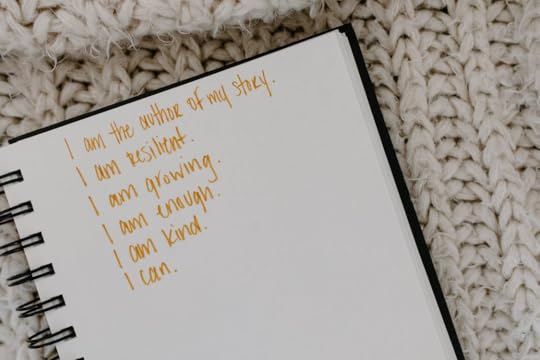
3. Keep a Journal
Journaling can be a great way to improve your mental health and improve relationships. Journaling helps relieve stress, can stop obsessive thoughts, and can help you become more self-aware. Over time, this can improve your relationships as you will be more conscious of negative or self-destructive behaviors or patterns.
If you’re new to journaling, start out with some of these self-care journal ideas. Set aside a specific time each day to write down your mood, thoughts, and anything that has been bothering you. You can make this as orderly or as creative as you like. Try drawing pictures to illustrate your feelings if this helps. Building a regular journaling habit will help clear your mind and help you keep track of your feelings day-to-day.
4. Get Outside
Some of the best self-care tips and activities are also the simplest and the cheapest. For example, even going for a short walk in a quiet area or a green space can drastically improve your mood. Try and choose a scenic spot with some nature, as visiting natural spaces promotes good mental health and helps keep our problems in perspective.
Again, to highlight the importance of self-love in relationships, habits like these improve self-love and self-worth because they remind us that we deserve to have enjoyable experiences and that we can have them alone. Looking for self-care tips during a pandemic? Long walks in nature are some of the top ones! It’s also one of the best self-care tips on a budget.
5. Treat Yourself to Alone Time
Many people who have low self-worth fear being alone. Taking steps to change this negative perception of alone time can truly benefit your mental health and improve relationships. Instead of panicking next time you find yourself with an empty evening to kill, consciously plan to do something enjoyable alone.
You could watch a favorite movie, have a bath and a glass of wine, or pick a book to read. This is one of the self-care tips lockdown encouraged us all to work on. When we learn to be content alone and to enjoy our own company, we suddenly feel stronger and more confident. This also makes us a better partner in relationships as we can support ourselves rather than relying on others.
6. Buy Yourself a Gift
We don’t need to rely on others to treat us. Sometimes, buying something for yourself can be extremely meaningful. It can give us a sense of accomplishment and independence when we pay for something ourselves. It also reinforces the idea that we are enough and that another person does not need to love us in order to validate us. Choose something that you know you will treasure and value. Your purchase will then come to symbolize your love and respect for yourself and will serve as a reminder if things get tough.

Conclusion
If you’re looking for self-care tips that actually work, make sure to try at least one from this list. But the first step is to understand the importance of self-love in relationships and try these tips to make it work. These suggestions can work well as standalone practices to improve mental health or can complement each other. Remember, when you change for yourself (rather than to please others), this is an act of self-love.
Final Call: Have you tried any of the self-care tips above? Have you understood the importance of self-love in relationships? Have any of these helped you during the pandemic? Share your experiences with us!
Author’s bio:
Miranda Davis is a freelance writer in the relation and psychology area. Miranda is interested in such topics as building healthy relationships between people, love/sex compatibility, and how to find the right balance in life in general. She is currently doing specific research on the topic. Miranda loves cooking and long-distance walking.
July 17, 2021
Humanity Ki Chain | An Initiative To Enable Mental Health Conversations |Sanity Daily
Back in 2019, I started with an initiative named “Humanity ki Chain” as a mental health conversation starter. Besides writing blogs, I wanted to work more towards enabling conversations around mental illnesses and I thought of coming up with a video series on my YouTube Channel – Rebel Poet.
I started reaching out to people from different walks of life, I specifically chose people who are already working in the field of mental health services or someone who has a story to share. The aim of this initiative was to enable others to talk about their feelings, to let them know they are not alone, to spread mental health awareness, break the stigma surrounding it, seek timely help and over the period of few months, I was able to record 17 episodes for season 1 of Humanity Ki Chain.
Last year, went on processing COVID-19 and, I made sure to create a lot of blog posts related to Covid support. With the rising mental health concerns, deteriorating mental wellness, it is very important that we talk about it and understand that there is no shame to own any feelings, and seeking help for your mind is equally essential like you do for your body.
That’s how we balance our mind, body and soul. That’s how we accept and acknowledge things around us, sometimes beyond our control but most of the time workable.
In my first season of “Humanity ki Chain”, the format of the videos was such that, I would place the recordings I use to receive from my guest and put them on my youtube channel. Since COVID-19 bought our life online, we learnt to survive on the internet and became a little more tech-savvy, so I am trying to make it more interesting this time with a new format, making it more interactive and effective.
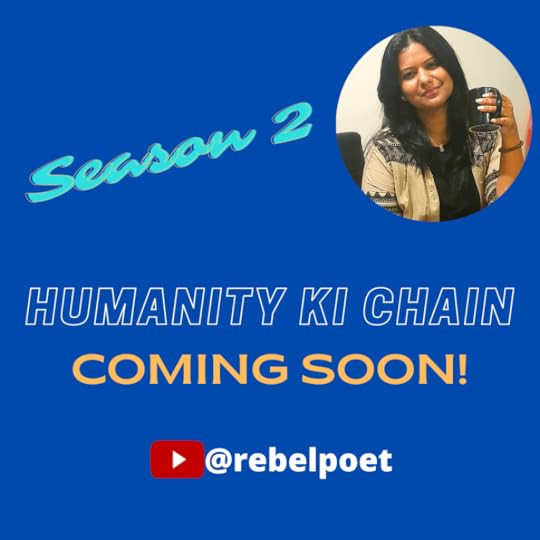 Humanity Ki ChainHumanity Ki Chain Season 2
Humanity Ki ChainHumanity Ki Chain Season 2During the past few months, I have been working hard to bring out the best content and best people to contribute their VOICES at my blog and now I am coming with the second season of Humanity Ki Chain, I am planning to make it 10 episodes series. Let’s see.
I have already begun interviewing guest speakers. And you can expect more insights and fresh perspectives from people coming out from different areas of life with their expertise. Some are mental health professors, neuro-linguistic programming coaches, life skill coaches, entrepreneurs and authors.
With every interview and interaction, I personally learn so much from them. In my first season, I interacted with amazing speakers. I learned about fibromyalgia from Pooja Priyamavada. Speakers like Arjun Gupta, Psychologist – Swati Bajpai, Vedica Saxena talked about seeking timely help. Vayjyanti Phugalia talked about practising Sakshi bhaav.
Each and every guest speaker contributed with their helpful insights. This year also, I will try to make it a very useful resource to anyone who wants to understand the different languages used in mental health conversations. Understand the sensitivity surrounding it and also realise there is no shame in having any disorders but yes seeking timely help is very much important.
With this, I announce the beginning of the second season of Humanity ki Chain, I am pretty much excited about it and want to give my best to my audience and subscribers.
In case, you have not subscribed to my channel Rebel Poet yet, you can do it right away. I will begin the series in the coming weeks. So, if you have any suggestions, feedback for the same, you are most welcome.
If you are a mental health professional or have worked in the mental health sphere, written books on mental health or have a story to share, then you may contact me at priyanka@sanitydaily.com
Love and light
……………………………………………………………………………

Priyanka Nair is the author of 26 Days 26 Ways for a Happier you and Ardhaviram. An NLP practitioner and Founder of Sanity Daily, helping you prioritize your mental health. Let’s build a happy community.
This blog post is part of the blog challenge ‘Blogaberry Dazzle’ hosted by Cindy D’Silva and Noor Anand Chawla and sponsored by Queen’s Brigade.
Humanity Ki Chain| An Initiative To Enable Mental Health Conversations|Sanity Daily
Back in 2019, I started with an initiative named “Humanity ki Chain” as a mental health conversation starter. Besides writing blogs, I wanted to work more towards enabling conversations around mental illnesses and I thought of coming up with a video series on my YouTube Channel – Rebel Poet.
I started reaching out to people from different walks of life, I specifically chose people who are already working in the field of mental health services or someone who has a story to share. The aim of this initiative was to enable others to talk about their feelings, to let them know they are not alone, to spread mental health awareness, break the stigma surrounding it, seek timely help and over the period of few months, I was able to record 17 episodes for season 1 of Humanity Ki Chain.
Last year, went on processing COVID-19 and, I made sure to create a lot of blog posts related to Covid support. With the rising mental health concerns, deteriorating mental wellness, it is very important that we talk about it and understand that there is no shame to own any feelings, and seeking help for your mind is equally essential like you do for your body.
That’s how we balance our mind, body and soul. That’s how we accept and acknowledge things around us, sometimes beyond our control but most of the time workable.
In my first season of “Humanity ki Chain”, the format of the videos was such that, I would place the recordings I use to receive from my guest and put them on my youtube channel. Since COVID-19 bought our life online, we learnt to survive on the internet and became a little more tech-savvy, so I am trying to make it more interesting this time with a new format, making it more interactive and effective.
 Humanity Ki ChainHumanity Ki Chain Season 2
Humanity Ki ChainHumanity Ki Chain Season 2During the past few months, I have been working hard to bring out the best content and best people to contribute their VOICES at my blog and now I am coming with the second season of Humanity Ki Chain, I am planning to make it 10 episodes series. Let’s see.
I have already begun interviewing guest speakers. And you can expect more insights and fresh perspectives from people coming out from different areas of life with their expertise. Some are mental health professors, neuro-linguistic programming coaches, life skill coaches, entrepreneurs and authors.
With every interview and interaction, I personally learn so much from them. In my first season, I interacted with amazing speakers. I learned about fibromyalgia from Pooja Priyamavada. Speakers like Arjun Gupta, Psychologist – Swati Bajpai, Vedica Saxena talked about seeking timely help. Vayjyanti Phugalia talked about practising Sakshi bhaav.
Each and every guest speaker contributed with their helpful insights. This year also, I will try to make it a very useful resource to anyone who wants to understand the different languages used in mental health conversations. Understand the sensitivity surrounding it and also realise there is no shame in having any disorders but yes seeking timely help is very much important.
With this, I announce the beginning of the second season of Humanity ki Chain, I am pretty much excited about it and want to give my best to my audience and subscribers.
In case, you have not subscribed to my channel Rebel Poet yet, you can do it right away. I will begin the series in the coming weeks. So, if you have any suggestions, feedback for the same, you are most welcome.
If you are a mental health professional or have worked in the mental health sphere, written books on mental health or have a story to share, then you may contact me at priyanka@sanitydaily.com
Love and light
……………………………………………………………………………

Priyanka Nair is the author of 26 Days 26 Ways for a Happier you and Ardhaviram. An NLP practitioner and Founder of Sanity Daily, helping you prioritize your mental health. Let’s build a happy community.
This blog post is part of the blog challenge ‘Blogaberry Dazzle’ hosted by Cindy D’Silva and Noor Anand Chawla and sponsored by Queen’s Brigade.
July 12, 2021
30 Most Influential Self-Help Books You Must Read in 2021
 2.) Life’s amazing secret -Gaur Gopal Das How to find balance and purpose in your life? Life’s amazing secret talks about finding your purpose in life and the key to lasting happiness.The author Gaur Gopal Das, shares practical tips that can be applied to strengthen your relationships, discover who you are, and to understand your capacities. A very insightful take with some handy workable tips towards the end of the book which will help you answer a few questions about yourself.
2.) Life’s amazing secret -Gaur Gopal Das How to find balance and purpose in your life? Life’s amazing secret talks about finding your purpose in life and the key to lasting happiness.The author Gaur Gopal Das, shares practical tips that can be applied to strengthen your relationships, discover who you are, and to understand your capacities. A very insightful take with some handy workable tips towards the end of the book which will help you answer a few questions about yourself.
 3.) The 7 Habits of Highly Effective People One of the self-help books you must read in 2021. It has captivated readers for 25 years and I am literally re-reading it. I am also sharing a summarised form of every chapter i.e each of the seven habits in my
personal blog.
This book has helped me to re-define a few concepts. How adopting new habits, replacing older habits with new ones, replacing old perspectives with fresh ones, helps us to see the world around us with a different view altogether.
3.) The 7 Habits of Highly Effective People One of the self-help books you must read in 2021. It has captivated readers for 25 years and I am literally re-reading it. I am also sharing a summarised form of every chapter i.e each of the seven habits in my
personal blog.
This book has helped me to re-define a few concepts. How adopting new habits, replacing older habits with new ones, replacing old perspectives with fresh ones, helps us to see the world around us with a different view altogether.
 4.) The Secret – Rhonda ByrneThe Secret is based on the belief of the law of attraction, which claims that thoughts can change a person’s life directly and yes it did had an impact on me. How I gave the key to my happiness in other’s hands and
how I took my chargeback in my hands.
In this book, the author Rhonda Byrne unveils the little secrets of life which may transform how people look at things and lead them on to the road of success and true happiness.
4.) The Secret – Rhonda ByrneThe Secret is based on the belief of the law of attraction, which claims that thoughts can change a person’s life directly and yes it did had an impact on me. How I gave the key to my happiness in other’s hands and
how I took my chargeback in my hands.
In this book, the author Rhonda Byrne unveils the little secrets of life which may transform how people look at things and lead them on to the road of success and true happiness.
 5.) Man’s Search for Meaning -Viktor FranklMan’s search for meaning is not only one of the self-help books you must read in 2021 but also an eye-opener for human suffering. A very insightful read in this tough time the whole world is
dealing with COVID-19.
In this book, the author and the holocaust survivor Viktor Frankl presents the remarkable idea of how we can choose to see a purpose or meaning in any situation, including the worst conditions.
5.) Man’s Search for Meaning -Viktor FranklMan’s search for meaning is not only one of the self-help books you must read in 2021 but also an eye-opener for human suffering. A very insightful read in this tough time the whole world is
dealing with COVID-19.
In this book, the author and the holocaust survivor Viktor Frankl presents the remarkable idea of how we can choose to see a purpose or meaning in any situation, including the worst conditions.
 6.) Ikigai- Albert Liebermann and Hector GarciaI am in love with this book, the book cover, and the entire essence of this book, Ikigai is just mesmerizing.
What makes a woman happy?
Good food and a good book so here is a not-to-miss book for anyone who is finding a meaning to get up every morning and be awesome.This book shares the secrets of the Japanese culture of longevity and happy life. This book will give you the life-changing tools to uncover your personal ikigai and help you find your true purpose in life.
6.) Ikigai- Albert Liebermann and Hector GarciaI am in love with this book, the book cover, and the entire essence of this book, Ikigai is just mesmerizing.
What makes a woman happy?
Good food and a good book so here is a not-to-miss book for anyone who is finding a meaning to get up every morning and be awesome.This book shares the secrets of the Japanese culture of longevity and happy life. This book will give you the life-changing tools to uncover your personal ikigai and help you find your true purpose in life.
 [image error]7.) Am I overthinking this –Michelle RialOh yes! We certainly are. We overthink, we procrastinate and after a while, we just become habitual of staying there. This book answers a lot of questions, like, how to achieve work-life balance? How to beat that imposter syndrome? or just as a basic question as you want some more coffee 🙂 Over-answering life’s questions in 101 charts.Author Michelle Rial is also an illustrator and she perfectly portrays what goes inside our minds through artful charts and funny, insightful questions.
[image error]
8.) How to tell depression to piss off – James Withey40 ways to get your life back! How do you get through each day when depression is telling you you’re not good enough? You can’t do it? You can’t get up. You can’t walk.The author of the book, James Withey knows depression personally and he knows what it does to you, how it makes you feel. This book proves to be a nice and helpful guide for others dealing with depression in a very subtle and humorous manner.
[image error]7.) Am I overthinking this –Michelle RialOh yes! We certainly are. We overthink, we procrastinate and after a while, we just become habitual of staying there. This book answers a lot of questions, like, how to achieve work-life balance? How to beat that imposter syndrome? or just as a basic question as you want some more coffee 🙂 Over-answering life’s questions in 101 charts.Author Michelle Rial is also an illustrator and she perfectly portrays what goes inside our minds through artful charts and funny, insightful questions.
[image error]
8.) How to tell depression to piss off – James Withey40 ways to get your life back! How do you get through each day when depression is telling you you’re not good enough? You can’t do it? You can’t get up. You can’t walk.The author of the book, James Withey knows depression personally and he knows what it does to you, how it makes you feel. This book proves to be a nice and helpful guide for others dealing with depression in a very subtle and humorous manner.
 9.) The Power of Now – Eckhart TolleAs the name suggests, this book propounds the theory of NOW, the gift you have in the form of the present day. This book takes you to an inspiring spiritual journey to discover your true self, to maximize your personal growth.Eckhart Tolle, in this book, takes you on an enlightening journey and shares deepest insights on how you can make a pain-free identity by living fully in the present.[image error]
9.) The Power of Now – Eckhart TolleAs the name suggests, this book propounds the theory of NOW, the gift you have in the form of the present day. This book takes you to an inspiring spiritual journey to discover your true self, to maximize your personal growth.Eckhart Tolle, in this book, takes you on an enlightening journey and shares deepest insights on how you can make a pain-free identity by living fully in the present.[image error]
 10.) The life-changing magic of tidying up- Marie KondoThis book did change my life! I was literally following the steps as I was reading this book. How lighter I felt after decluttering my house and eventually decluttering my mind. The Japanese art of decluttering and organizing. One of the most influential and one of the best self-help books you must read in 2021. Many of you must be familiar with the Konmari technique of Marie Kondo, which works on categorizing the things in your house like the ones that “spark joy” and which don’t. This international bestseller will help you clear your clutter and enjoy the unique magic of a tidy home.
10.) The life-changing magic of tidying up- Marie KondoThis book did change my life! I was literally following the steps as I was reading this book. How lighter I felt after decluttering my house and eventually decluttering my mind. The Japanese art of decluttering and organizing. One of the most influential and one of the best self-help books you must read in 2021. Many of you must be familiar with the Konmari technique of Marie Kondo, which works on categorizing the things in your house like the ones that “spark joy” and which don’t. This international bestseller will help you clear your clutter and enjoy the unique magic of a tidy home.
 11.) How to win friends and influence people- Dale CarnegieI think this was my few of the first reads, this book is so old that the pages have become yellowish but the perspective and those ‘HOW TO’ are still so fresh and relatable.How to win friends and influence people is I guess the pioneer of this self-help genre. It has literally helped many of us to shape our personalities. This book has been acclaimed by many eminent personalities to date.
[image error]
12.) The subtle art of not giving f*ck- Mark MansonThis book got my attention due to the vibrant cover and the name itself is so real and to the point. We all need to learn this subtle art. I mean how much f*ucks are we going to giving anyway.What happens when we fill extra air in the balloon? IT BURSTS! We need to stop at the right time and I find this book as a very handy and easy guide, where the author Mark Manson talks about daily struggles and how dealing with them affects us and how we can not fall for everything said to us.
11.) How to win friends and influence people- Dale CarnegieI think this was my few of the first reads, this book is so old that the pages have become yellowish but the perspective and those ‘HOW TO’ are still so fresh and relatable.How to win friends and influence people is I guess the pioneer of this self-help genre. It has literally helped many of us to shape our personalities. This book has been acclaimed by many eminent personalities to date.
[image error]
12.) The subtle art of not giving f*ck- Mark MansonThis book got my attention due to the vibrant cover and the name itself is so real and to the point. We all need to learn this subtle art. I mean how much f*ucks are we going to giving anyway.What happens when we fill extra air in the balloon? IT BURSTS! We need to stop at the right time and I find this book as a very handy and easy guide, where the author Mark Manson talks about daily struggles and how dealing with them affects us and how we can not fall for everything said to us.
 13.) Life is what you make it – Preeti ShenoyI read this book when my daughter was just a few months old and I was enjoying my new motherhood phase. I still remember, my husband was out on tour for a few days and I finished the book at one go.This little book by Preeti Shenoy is based on a love story. How a girl deals with her bipolar disorder and fights against all the odds and how she decides to take charge of her own life.
[image error]
[image error]14.) Judgment Detox -Gabrielle BernsteinGood judgment or bad judgment, judgment is toxic. In this book, Gabrielle Bernstein shares how we can free ourselves from this judgment malady.Surely one of the best self-help books you must read in 2021, it will help you to release the beliefs that hold you back from living a better life. With this book you will be able to heal your perceptions and when you shift your energy from defensive judgment to free-flowing love your life gets awesome.
[image error]
15.) My Gita – Devdutt Pattanaik Bhagwad Gita, one of the best self-help books. If you find it difficult to read THE GITA, give this one a try. Author Devtutt Pattnaik, in this book, highlights how Krishna guides Arjuna. How to understand things rather than judging them.Self-awareness, self-improvement, self-reflection, and self-realization, this book will help you to think proactively and help you gain a different perspective on life. You might many answers while you read it.
[image error]
16.) The power of NOW journal -Eckhart TolleAn international bestselling book, it has inspired a generation and is as popular today as it was a decade ago when first published. This book enables its reader to access our deepest self, by freeing ourselves from the conflicting, unreasonable demands of the mind and living present, fully and intensely, in the Now. Call it mindfulness or THE POWER OF NOW, is the bible du jour – a must-read for anyone looking for a modern take on spirituality.
[image error]
17.) Inner Engineering -SadhguruThis is yet another favorite book of mine, I have also done the Inner engineering Workshop after reading this book and I cannot praise it enough. I have always admired the wisdom shared by Sadhguru and this book is a tested path to achieve well-being.“Self-transformation means that nothing of the old remains. It is a dimensional shift in the way you perceive and experience life”, says Sadhguru and as you read this book you discover a revolutionary way of thinking about our humanity and the opportunity to achieve nothing less than a life of joy.
[image error]
18.) The Four Agreements -Don Miguel RuizIn The Four Agreements, don Miguel Ruiz reveals the source of self-limiting beliefs that rob us of joy and create needless suffering.The Four Agreements are: Be Impeccable With Your Word, Don’t Take Anything Personally, Don’t Make Assumptions, Always Do Your Best. So I am sure this book will help you to learn and discover so many things about yourselves.
[image error]
19.) The Power of your subconscious mind- Joseph MurphyThe subconscious mind is a powerful secondary system that runs everything in your life. A very powerful and uplifting book, after reading this, one actually feels he or she can do anything in this world. At least I felt so. So yes, it is yet another one of the self-help books you must read in 2021. This book can help you heal yourself, banish your fears, sleep better, enjoy better relationships, and just feel happier. It states very simple and effective techniques and results in an improved mindset to deal with your relationships, your finances, your physical well-being.
[image error]
20.) The Biology of Belief – Bruce LiptonI must confess this one was a bit heavy one for me. It took a lot of time for a layman like me to understand the wisdom of Mr. Lipton. But yes this book unfolds a very different perspective and vision to our day to day problems.I simple words, his research says that our genes and DNA do not control our biology; that instead DNA is controlled by signals from outside the cell, including the energetic messages emanating from our positive and negative thoughts. An Interesting read!
[image error]
21.) The 5 AM Club- Robin SharmaWho is from the 5 am club here? This book is based on a revolutionary morning routine that has helps people to maximize their productivity, activate their best health, and bulletproof their serenity in this age of overwhelming complexity.A story about two struggling strangers who meet an eccentric tycoon who becomes their secret mentor. You will discover, a step-by-step method to protect the quietest hours of your day so you have time for exercise, self-renewal, and personal growth.
[image error]
22.) Eat That Frog! -Brian TracyWell, not literally! This book shares 21 Great Ways to Stop Procrastinating and Get More Done in Less Time. Author Brian Tracy, helps you to walk the road to be more productive and not fall for the technology and being a slave of it.
[image error]
[image error]23.) Think and Grow Rich – Napoleon HillOne of Napoleon Hill’s Classic Book. it not about reading a book, it is about what you do after reading that book, which makes a difference in your life. We read so many books and get inspired, but unless we apply our learning we will stay deprived of all the awesomeness it has to offer to us. This is one such book that shares a lot of power but you got to grab it.
[image error]
[image error]24.) You can win – Shiv KheraI read this book when I was pursuing my master’s in business administration and I remember how our faculties used to recommend this book to us to gain some self-confidence and radiate a positive personality. A Step by Step Tool for Top Achievers. This book helps you to dispel confusion in daily life and clarify values.
[image error]
25.) Awaken The Giant Within – Tony RobbinsOne of the power-packed self-help books you must read in 2021 is by Anthony Robbins, popularly known as Tony Robbins. I came to know about his work when I underwent NLP training last year. I started listening to his audio and videos.The book, Awaken the giant withing is a complete package of self-improvement, self-work and self-building, maybe from scratch, a must-have in your collection.
[image error]
26.) The Midnight Library – Matt HaigA lot of reviews started to pour in as soon as the book got its spot in the market. I got intrigued by the name first, then the cover and then started following the author on Instagram. I was amazed by his work.Another must-have in your self-help books collection this year.
[image error]
27.) The Comfort Book- Matt HaigFollowed by the Midnight Library, I wanted to read more stuff written by the author. I put this book in one of the best self-help books you must read in the 2021 list because it is simply thought-provoking, inspiring and motivating.
[image error]
28.) A Radical Awakening – Dr. Shefali TsabaryThis book is a must for every woman out there who wants to think out of the box and make a difference in their life. It shows a path to discover your true potential and own your inner powers to help others in their journey.Dr Shefali helps women uncover the purpose that already exists within them and harness the power of authenticity in every area of their lives. The book is ever-inspiring and is backed with real-life examples and personal stories, that unlocks the extraordinary power necessary to awaken the conscious self.
[image error]
29.) The Conscious Parent – Dr. Shefali TsabaryThis book a very subtle message that to empower our kids, we must empower ourselves first. Parenting is not an easy job and nobody is a parent.In this book, the author Dr Tsabary asks us to set aside traditional parenting strategies that major in controlling our children and instead find true kinship with their spirits by tuning into who each child is in its own unique essence.
[image error]
30.) How To Stop Worrying and Start Living – Dale CarnegieA very light read, suggesting practical advice for day-to-day life challenges. Problems, habits, negativity, stressors, situations and much more. This book is again one of the self-help books you must read in 2021. It is a very old book by the bestselling author Dale Carnegie, offering practical advice and helpful solutions to stop worrying and live your best life.
[image error]
So this was my compilation of the best 30 self-help books you must read in 2021, and it is all about perspectives and the right mindset which is the common ingredient you will find in most of the above-mentioned books. Grab a copy of any of the books I have recommended above and let me know if it really had a life-changing impact on you or at least it gave you a wonderful reading experience. See you soon. Till then take care of your mental health and stay safe. Love and light
13.) Life is what you make it – Preeti ShenoyI read this book when my daughter was just a few months old and I was enjoying my new motherhood phase. I still remember, my husband was out on tour for a few days and I finished the book at one go.This little book by Preeti Shenoy is based on a love story. How a girl deals with her bipolar disorder and fights against all the odds and how she decides to take charge of her own life.
[image error]
[image error]14.) Judgment Detox -Gabrielle BernsteinGood judgment or bad judgment, judgment is toxic. In this book, Gabrielle Bernstein shares how we can free ourselves from this judgment malady.Surely one of the best self-help books you must read in 2021, it will help you to release the beliefs that hold you back from living a better life. With this book you will be able to heal your perceptions and when you shift your energy from defensive judgment to free-flowing love your life gets awesome.
[image error]
15.) My Gita – Devdutt Pattanaik Bhagwad Gita, one of the best self-help books. If you find it difficult to read THE GITA, give this one a try. Author Devtutt Pattnaik, in this book, highlights how Krishna guides Arjuna. How to understand things rather than judging them.Self-awareness, self-improvement, self-reflection, and self-realization, this book will help you to think proactively and help you gain a different perspective on life. You might many answers while you read it.
[image error]
16.) The power of NOW journal -Eckhart TolleAn international bestselling book, it has inspired a generation and is as popular today as it was a decade ago when first published. This book enables its reader to access our deepest self, by freeing ourselves from the conflicting, unreasonable demands of the mind and living present, fully and intensely, in the Now. Call it mindfulness or THE POWER OF NOW, is the bible du jour – a must-read for anyone looking for a modern take on spirituality.
[image error]
17.) Inner Engineering -SadhguruThis is yet another favorite book of mine, I have also done the Inner engineering Workshop after reading this book and I cannot praise it enough. I have always admired the wisdom shared by Sadhguru and this book is a tested path to achieve well-being.“Self-transformation means that nothing of the old remains. It is a dimensional shift in the way you perceive and experience life”, says Sadhguru and as you read this book you discover a revolutionary way of thinking about our humanity and the opportunity to achieve nothing less than a life of joy.
[image error]
18.) The Four Agreements -Don Miguel RuizIn The Four Agreements, don Miguel Ruiz reveals the source of self-limiting beliefs that rob us of joy and create needless suffering.The Four Agreements are: Be Impeccable With Your Word, Don’t Take Anything Personally, Don’t Make Assumptions, Always Do Your Best. So I am sure this book will help you to learn and discover so many things about yourselves.
[image error]
19.) The Power of your subconscious mind- Joseph MurphyThe subconscious mind is a powerful secondary system that runs everything in your life. A very powerful and uplifting book, after reading this, one actually feels he or she can do anything in this world. At least I felt so. So yes, it is yet another one of the self-help books you must read in 2021. This book can help you heal yourself, banish your fears, sleep better, enjoy better relationships, and just feel happier. It states very simple and effective techniques and results in an improved mindset to deal with your relationships, your finances, your physical well-being.
[image error]
20.) The Biology of Belief – Bruce LiptonI must confess this one was a bit heavy one for me. It took a lot of time for a layman like me to understand the wisdom of Mr. Lipton. But yes this book unfolds a very different perspective and vision to our day to day problems.I simple words, his research says that our genes and DNA do not control our biology; that instead DNA is controlled by signals from outside the cell, including the energetic messages emanating from our positive and negative thoughts. An Interesting read!
[image error]
21.) The 5 AM Club- Robin SharmaWho is from the 5 am club here? This book is based on a revolutionary morning routine that has helps people to maximize their productivity, activate their best health, and bulletproof their serenity in this age of overwhelming complexity.A story about two struggling strangers who meet an eccentric tycoon who becomes their secret mentor. You will discover, a step-by-step method to protect the quietest hours of your day so you have time for exercise, self-renewal, and personal growth.
[image error]
22.) Eat That Frog! -Brian TracyWell, not literally! This book shares 21 Great Ways to Stop Procrastinating and Get More Done in Less Time. Author Brian Tracy, helps you to walk the road to be more productive and not fall for the technology and being a slave of it.
[image error]
[image error]23.) Think and Grow Rich – Napoleon HillOne of Napoleon Hill’s Classic Book. it not about reading a book, it is about what you do after reading that book, which makes a difference in your life. We read so many books and get inspired, but unless we apply our learning we will stay deprived of all the awesomeness it has to offer to us. This is one such book that shares a lot of power but you got to grab it.
[image error]
[image error]24.) You can win – Shiv KheraI read this book when I was pursuing my master’s in business administration and I remember how our faculties used to recommend this book to us to gain some self-confidence and radiate a positive personality. A Step by Step Tool for Top Achievers. This book helps you to dispel confusion in daily life and clarify values.
[image error]
25.) Awaken The Giant Within – Tony RobbinsOne of the power-packed self-help books you must read in 2021 is by Anthony Robbins, popularly known as Tony Robbins. I came to know about his work when I underwent NLP training last year. I started listening to his audio and videos.The book, Awaken the giant withing is a complete package of self-improvement, self-work and self-building, maybe from scratch, a must-have in your collection.
[image error]
26.) The Midnight Library – Matt HaigA lot of reviews started to pour in as soon as the book got its spot in the market. I got intrigued by the name first, then the cover and then started following the author on Instagram. I was amazed by his work.Another must-have in your self-help books collection this year.
[image error]
27.) The Comfort Book- Matt HaigFollowed by the Midnight Library, I wanted to read more stuff written by the author. I put this book in one of the best self-help books you must read in the 2021 list because it is simply thought-provoking, inspiring and motivating.
[image error]
28.) A Radical Awakening – Dr. Shefali TsabaryThis book is a must for every woman out there who wants to think out of the box and make a difference in their life. It shows a path to discover your true potential and own your inner powers to help others in their journey.Dr Shefali helps women uncover the purpose that already exists within them and harness the power of authenticity in every area of their lives. The book is ever-inspiring and is backed with real-life examples and personal stories, that unlocks the extraordinary power necessary to awaken the conscious self.
[image error]
29.) The Conscious Parent – Dr. Shefali TsabaryThis book a very subtle message that to empower our kids, we must empower ourselves first. Parenting is not an easy job and nobody is a parent.In this book, the author Dr Tsabary asks us to set aside traditional parenting strategies that major in controlling our children and instead find true kinship with their spirits by tuning into who each child is in its own unique essence.
[image error]
30.) How To Stop Worrying and Start Living – Dale CarnegieA very light read, suggesting practical advice for day-to-day life challenges. Problems, habits, negativity, stressors, situations and much more. This book is again one of the self-help books you must read in 2021. It is a very old book by the bestselling author Dale Carnegie, offering practical advice and helpful solutions to stop worrying and live your best life.
[image error]
So this was my compilation of the best 30 self-help books you must read in 2021, and it is all about perspectives and the right mindset which is the common ingredient you will find in most of the above-mentioned books. Grab a copy of any of the books I have recommended above and let me know if it really had a life-changing impact on you or at least it gave you a wonderful reading experience. See you soon. Till then take care of your mental health and stay safe. Love and light
Priyanka Nair is the author of 26 Days 26 Ways for a Happier you and Ardhaviram. An NLP practitioner and Founder of Sanity Daily, helping you prioritize your mental health. Let’s build a happy community. P.S: This post contains affiliate links and I may earn a small commision if you purchase a book through my blog.



